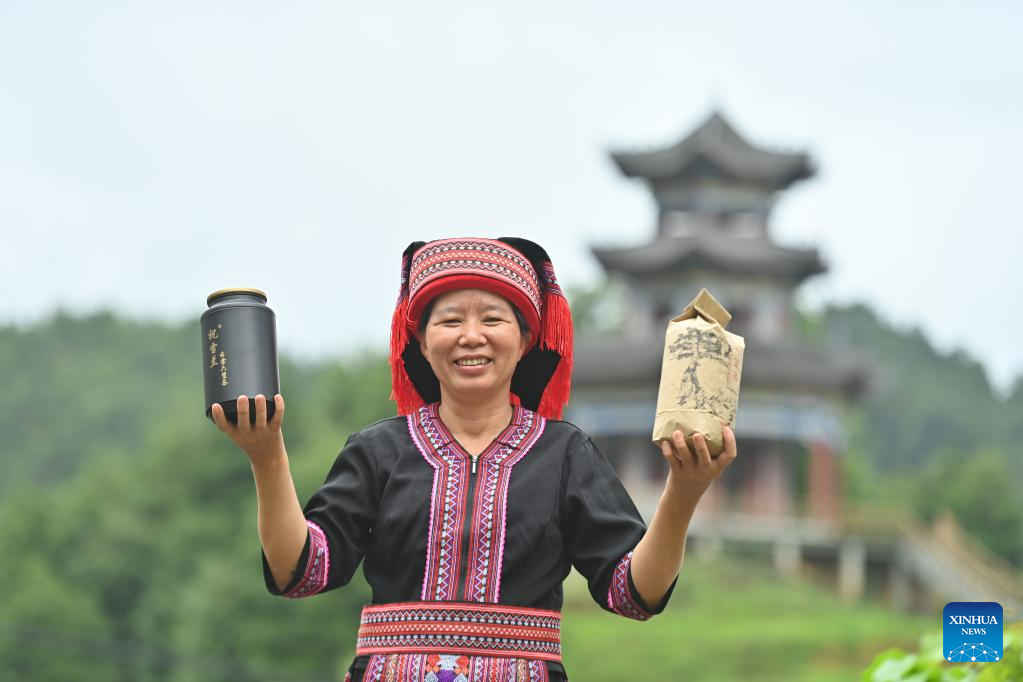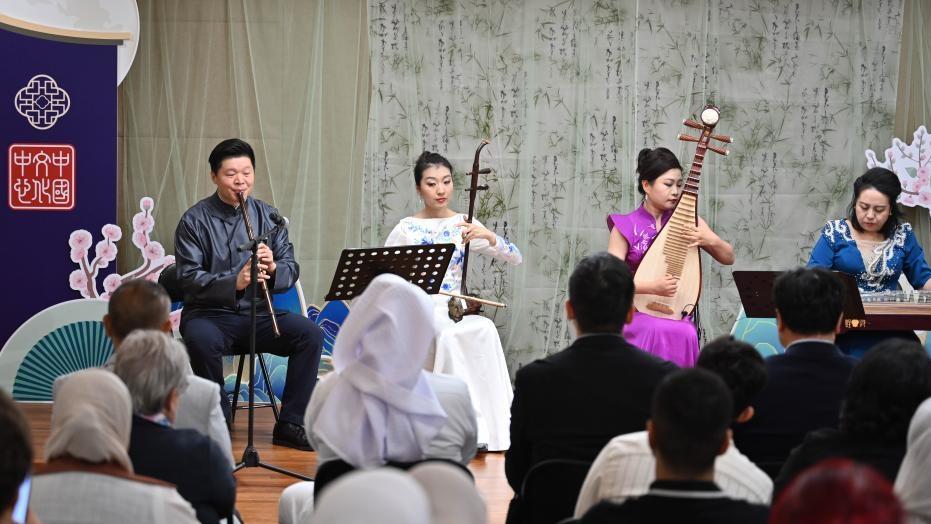Collective land-for-shares policy boosts Liubao tea industry in Guangxi
Zhu Xuelan, an inheritor of the Liubao tea-making technique, often picks fresh tea leaves in her tea garden in Shanping village, Liubao town, Cangwu county, Wuzhou city in south China's Guangxi Zhuang Autonomous Region.
"The land issue has been resolved, and funding is no longer a worry — all thanks to collective land-for-shares policy," Zhu said.

Zhu Xuelan demonstrates the tea she made at Shanping village of Cangwu county, south China's Guangxi Zhuang Autonomous Region, June 7, 2023.(Xinhua/Huang Xiaobang)
The Xugou village group, where she is from, invested 0.63 mu (420 square meters) of collective construction land as shares in her tea factory, not only addressing her urgent needs but also securing collective income for the village group for the next 20 years.
After being elected secretary of the Party branch of Shanping village in 2008, Zhu mobilized villagers to build roads and plant tea trees. Through a cooperation model integrating the Party branch, her cooperative, and local farmers, her tea cooperative purchases tea leaves from growers.
As the tea garden expanded, factory space gradually became insufficient. A turning point arrived in May 2024, when Cangwu county was designated by Guangxi's natural resources department as one of the first pilot counties for natural resource policies supporting all-round rural revitalization. The department has supported Cangwu's exploration of allowing rural collective economic organizations and other qualified entities or individuals to use collective construction land as shares in enterprises, helping solve common difficulties in rural land used for industrial development and financing.
Zhu's tea factory contributed 2.5 million yuan (about $351,716.5), while the village group invested collective construction land as shares for joint operations. The land is now used by the factory for Liubao tea processing, with the factory paying returns to the village group. Villagers can receive dividends through a "guaranteed returns plus fixed dividends" model without taking part in daily management.
The cooperative's annual purchases of fresh Liubao tea leaves from Shanping village and surrounding areas are expected to exceed 20 million yuan.
A county bank issued loans totaling 30 million yuan to Zhu after the real estate certificate for the land contributed as shares was granted to her.
The collaboration between village groups and enterprises has enabled registration and confirmation of collective construction land use rights. Land contributed as shares has successfully completed real estate mortgage registration, making property-rights-backed financing possible.
The success in Xugou village group also drew the attention of Tan Aiyun, another inheritor of the Liubao tea-making technique. As the founder of a tea factory in Siliu village, Liubao town, Tan has recently been concerned about expanding her factory site and raising funds.
Beyond Tan, 18 other tea enterprises in Liubao town have put forward demands for land used for industrial development this year.
"It's not just tea companies — livestock farms, rice noodle producers, timber processors and other enterprises have been calling to ask about our land-for-shares policy. They have high expectations for this model," said Li Mingkai, director of Cangwu county's natural resources bureau.
Photos
 Chamber Concert of Chinese Classical Music held at China Cultural Center in Kuwait
Chamber Concert of Chinese Classical Music held at China Cultural Center in Kuwait 27th Harbin Ice-Snow World to officially begin construction in NE China
27th Harbin Ice-Snow World to officially begin construction in NE China Promotion week for intangible cultural heritage brands opens in Dali, China's Yunnan
Promotion week for intangible cultural heritage brands opens in Dali, China's Yunnan First batch of wintering black-headed gulls arrive at Lugu Lake in Yunnan
First batch of wintering black-headed gulls arrive at Lugu Lake in Yunnan
Related Stories
- Guangxi Int'l Forest Products and Wood Products Exhibition 2025 kicks off
- China (Guangxi) Geographical Indication Products Exhibition held in Geneva
- Pinglu Canal takes shape, breathing new life into the Beibu Gulf
- Agricultural fair held in Rongshui Miao Autonomous County, Guangxi
- Chives industry developed in Sandu Town, China's Guangxi
- Silkworm industry boosts growth of local income and enriches farmers in Xincheng County of Guangxi
- Scenery of China's Guangxi
- Harvest celebration held in S China's Guangxi
- S China's Guangxi unveils plan for international ecological island at ASEAN-China Environmental Cooperation Forum
- Scenery of Longji Rice Terraces in Longsheng County, China's Guangxi
Copyright © 2025 People's Daily Online. All Rights Reserved.





